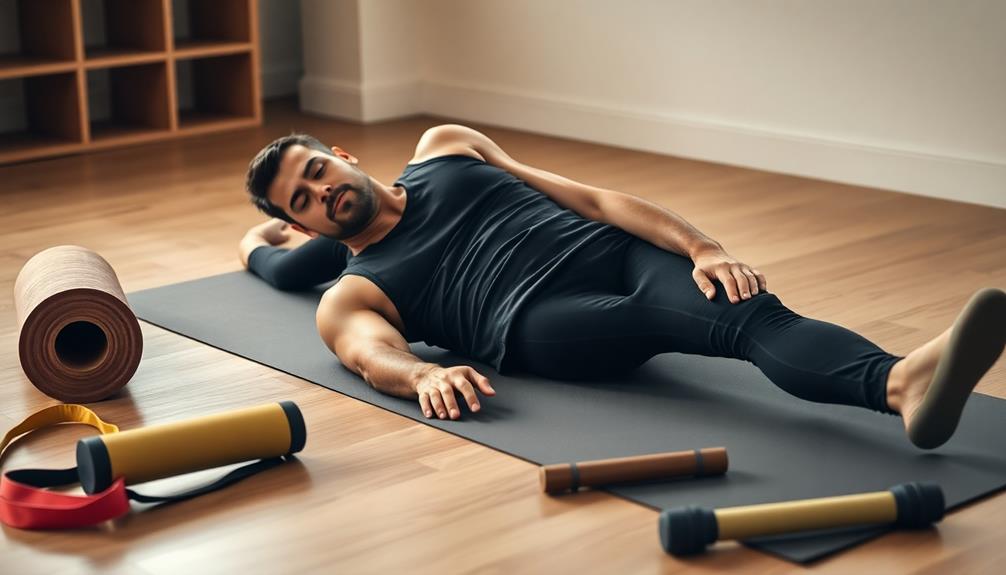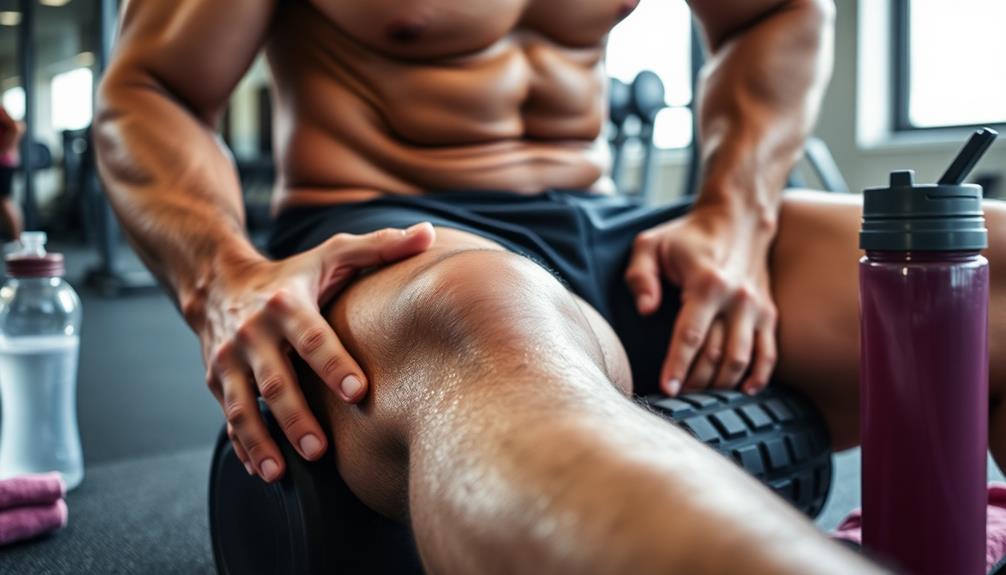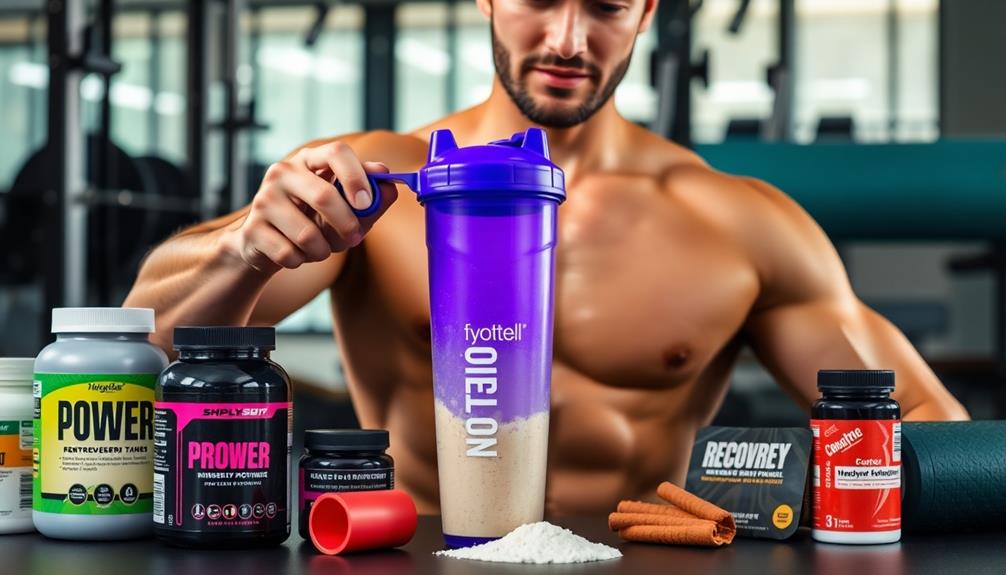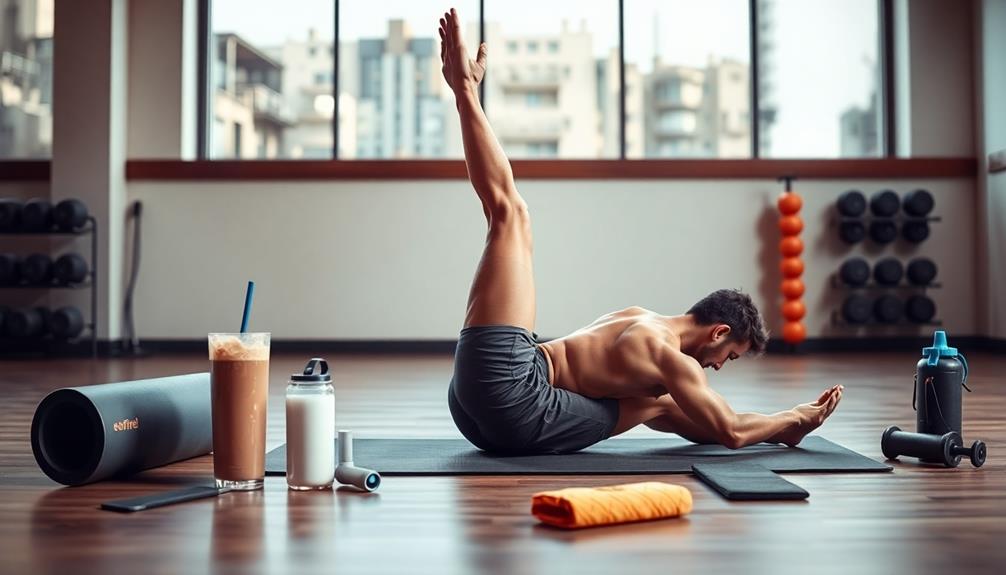To improve post-workout muscle recovery times, focus on these key strategies: Hydrate strategically before, during, and after exercise. Prioritize protein intake to support muscle repair. Implement active recovery through low-intensity activities. Optimize sleep quality for enhanced recovery. Try foam rolling to alleviate muscle tension. Supplement wisely with nutrients that aid recovery. Practice mindful stretching to improve flexibility. Manage stress levels, as they can impact recovery. Listen to your body and adjust workout intensity accordingly. Don't forget to incorporate rest days to allow for complete muscle repair and growth. These tips will help you maximize your fitness gains and minimize recovery time.
Core Insight
- Prioritize protein intake immediately after workouts to support muscle repair and growth.
- Implement active recovery techniques like light exercise or stretching to promote blood flow and reduce soreness.
- Optimize sleep quality and duration to allow your body sufficient time for recovery and hormone regulation.
- Use foam rolling or massage therapy to alleviate muscle tension and improve circulation.
- Stay well-hydrated before, during, and after workouts to support cellular repair and nutrient transport.
Hydrate Strategically

Drinking water strategically can help your muscles recover after a workout. Start by hydrating 2-3 hours before exercising. During your workout, keep sipping water, especially if it's intense or long. For workouts over an hour, think about having a sports drink to replace lost electrolytes. After your workout, drink 16-24 ounces of fluid for each pound you lost while exercising. This will help you recover. Proper hydration is about more than just drinking water. It's also about when you drink, how much you drink, and choosing the right fluids. Following these tips will support your body's recovery and improve your overall performance.
Prioritize Protein Intake

Protein is key for muscle recovery after a workout. Aim to eat protein within 30 minutes of exercising, when your muscles can use it best. Certain mushroom extracts like Cordyceps may boost recovery and protein use too.
Go for high-quality proteins such as lean meats, fish, eggs, or plant proteins like beans and tofu. A protein shake works if you're in a rush. Try to get 20-30 grams of protein after exercise, based on your weight and workout intensity.
Remember to eat protein throughout the day, not just post-workout. This keeps your muscles repairing and growing. By making protein a priority, you'll recover quicker and perform better next time you hit the gym.
Implement Active Recovery

Active recovery is a great way to help your muscles recover after a workout. Instead of just resting, do low-intensity activities that get your blood flowing and reduce muscle stiffness. Some good options are light jogging, swimming, or cycling for 20-30 minutes on your rest days. You can also try foam rolling to release tension in your muscles and improve circulation.
Active recovery helps get rid of waste products in your muscles, which reduces soreness and fatigue. It also helps you stay flexible and maintains your fitness level between tough workouts. Try adding some gentle stretching or yoga to your routine to help you recover even better and avoid injuries.
Pay attention to how your body feels and adjust your active recovery sessions if needed. If you're really sore or tired, choose gentler activities like walking or light stretching. By doing active recovery, your muscles will recover faster, and you'll be ready for your next workout.
Optimize Sleep Quality

Getting enough good sleep is just as important as active recovery for helping your muscles repair themselves after a workout. While you sleep, your body makes growth hormones that help your muscles fix and build themselves. To get the best sleep, make a bedtime routine you stick to and try to get 7-9 hours of sleep without interruption each night.
Some ways to sleep better:
| Time | Action | Benefit |
|---|---|---|
| 2 hours before bed | Stay off screens | Less blue light |
| 1 hour before bed | Take a warm bath | Relax body and mind |
| 30 minutes before bed | Meditate | Less stress and worry |
| Bedtime | Hang blackout curtains | Make the room dark |
Try Foam Rolling

Foam rolling is a simple way to help your muscles feel better after a workout. It works by putting pressure on your muscles to release tension and soreness. To start, buy a foam roller and spend 10-15 minutes using it after exercising. Look for a firm roller that can press deeply into your muscles. Some rollers have bumps or ridges that feel like a massage therapist's hands.
Start with big muscles like your thighs, hamstrings, and back. Roll slowly and stop on tight spots for 20-30 seconds. Press firmly, but not so hard that it hurts. You'll feel knots and tightness loosen up as you roll.
Use your foam roller every day, not just after workouts, for the best results. It will help you be more flexible, improve blood flow, and recover faster. Take deep breaths and drink plenty of water while rolling. If you use your foam roller regularly, you'll see big improvements in how your muscles feel and move.
Utilize Contrast Therapy

Contrast therapy is a great way to speed up muscle recovery after tough workouts. You can do it at home or at the gym. First, apply heat to your muscles for 3-5 minutes with a hot shower, sauna, or heating pad. This boosts blood flow and loosens tight muscles. Next, switch to cold for 1-2 minutes using an ice pack, cold shower, or ice bath. The cold reduces swelling and muscle soreness. You can also use recovery compression gear during the cold part to help your muscles recover and improve circulation. Repeat this process 3-4 times, always ending with cold. Try to do contrast therapy within an hour after your workout for the best results. Pay attention to how your body feels and change the temperatures and times if needed. Using contrast therapy regularly can improve your recovery times and performance.
Supplement Wisely

Supplements can help you recover after a workout. Protein is important for rebuilding muscle. Whey protein is a good choice because your body absorbs it quickly. BCAAs can reduce muscle soreness and fatigue. HMB supplements may boost performance and recovery, and there are different types to choose from.
Carbs are also important. They refill your energy stores and help your body use protein to build muscle. It's good to have both fast and slow-digesting carbs. Creatine is another supplement that can improve muscle recovery and strength.
Omega-3s can reduce inflammation and support muscle health. Before starting any new supplements, talk to a doctor. Everyone's needs are different.
Practice Mindful Stretching

Mindful stretching is key for recovering after a workout. It's not just going through the motions but focusing on each stretch and your body's response. Find a quiet space to concentrate. As you stretch, breathe deeply, inhaling and exhaling slowly. This relaxes your muscles and increases oxygen flow. Compression sleeves can help target specific muscles and improve circulation during stretching.
Focus on the muscle groups you worked during exercise. Hold each stretch for 15-30 seconds without bouncing or forcing it. Listen to your body and stop if you feel pain. Stretching shouldn't hurt. Use both static and dynamic stretches, depending on your workout. Mindful stretching improves flexibility, reduces muscle tension, and may shorten recovery time between workouts.
Manage Stress Levels

Managing stress is crucial for muscle recovery. Too much stress can make it harder for your body to repair and rebuild muscle tissue, which may slow down your recovery. To reduce stress, try relaxation techniques like deep breathing, meditation, or yoga. These can help calm your mind and lower cortisol levels. Aim for 7-9 hours of quality sleep each night, as it's essential for hormone balance and muscle repair. Melatonin supplements or herbal teas may improve your sleep. Make a schedule that includes both work and fun activities. Spend time with friends and family for emotional support and stress relief. If you feel overwhelmed, consider talking to a therapist or counselor who can provide personalized coping strategies.
Listen to Your Body

Paying attention to your body is key for muscle recovery. During and after workouts, notice how you feel. This helps you make good choices about rest, food, and how hard to train. Using foam rollers can make you more aware of your body and find areas that need extra care while recovering.
Do these four things to listen to your body:
- Notice your energy levels during the day
- Watch for sore or tired muscles
- Keep track of how much and how well you sleep
- See if your mood or motivation changes
If you feel tired all the time, have more soreness than usual, or can't perform as well, you probably need more recovery time. Don't ignore these signs. Pushing too hard can cause overtraining and injuries. Instead, change your workouts, take more rest days, or do easier activities until you feel fully recovered.
Frequently Asked Questions
How Long Should I Wait Before Working Out the Same Muscle Group Again?
You should typically wait 48-72 hours before working out the same muscle group again. This allows for proper recovery and muscle growth. However, factors like workout intensity, your fitness level, and nutrition can influence this timeframe.
Can Massage Therapy Help With Muscle Recovery After Intense Workouts?
Yes, massage therapy can greatly help with muscle recovery after intense workouts. It'll improve blood flow, reduce inflammation, and alleviate soreness. You'll experience faster recovery times and may be able to return to training sooner.
Are Ice Baths More Effective Than Hot Baths for Muscle Recovery?
Ice baths can be more effective than hot baths for muscle recovery. They reduce inflammation and soreness faster. However, you'll find that alternating between cold and hot therapies (contrast therapy) might give you the best overall results for your muscles.
Does Age Affect Muscle Recovery Time, and How Can Older Athletes Adapt?
Yes, age slows muscle recovery. As an older athlete, you'll need more time to recuperate. You can adapt by increasing rest periods, focusing on proper nutrition, staying hydrated, and incorporating gentle stretching or yoga into your routine.
What Role Do Genetics Play in an Individual's Muscle Recovery Capabilities?
Your genetics greatly influence muscle recovery capabilities. You'll find that your DNA affects protein synthesis rates, inflammation response, and muscle fiber composition. These genetic factors can impact how quickly you recover and adapt to exercise stress.

